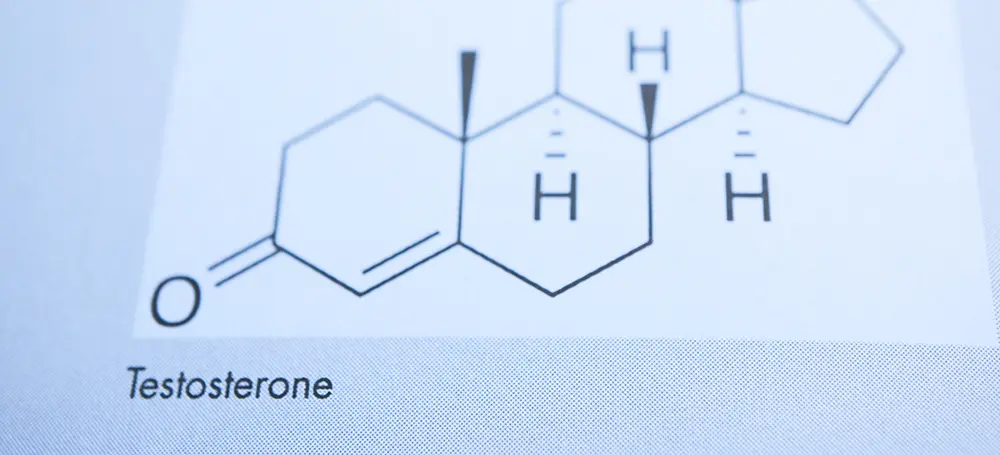You probably don’t give much thought to your hormone levels on a day-to-day basis, but these chemical signals play an essential role in your overall health and well-being. From regulating your mood to your energy levels, your hormones carry out a wide range of functions behind the scenes. If you ever find yourself feeling a little off, whether you’re in a bad mood or feel more sluggish than usual, you likely have your hormones to blame. And as the male sex hormone, testosterone is the chief contributor to these changes occurring in your body.
Low testosterone is something all men want to avoid. Unfortunately, many men with low T believe that their hormone deficiency is simply outside of their control. In reality, though, your lifestyle choices and everyday habits have an influence on your hormone health. By making a few positive changes here and there, you can help boost your testosterone levels and enjoy better health and well-being all around.
Here are 8 crucial factors that have a significant impact on your testosterone levels.
1. Age
For most men, their testosterone levels are directly correlated to their age. Studies show that men start to experience a gradual decline in testosterone levels in their forties. Generally speaking, you can expect to lose about 1%-2% of testosterone each year once you turn 40. As this process accelerates over time, you may exhibit signs of low T by the time you reach your fifties or sixties. This gradual decline in hormone levels is a completely natural phenomenon that accompanies the aging process. In fact, more than a third of men over 45 have symptoms of low testosterone.
While it’s normal to have reduced levels of testosterone as you age, it’s also possible for this process to occur prematurely. If you’ve noticed symptoms of low T in your 30s or younger, you might qualify for hormone therapy. It’s a good idea to talk to your doctor if you’re concerned about any symptoms you have. Once you have a better understanding of the root cause of your hormone deficiency, you can ensure that you find the best testosterone clinic in Boston for your needs.
2. Diet
You already know that eating healthy helps strengthen your immune system and boosts your vitality. However, you may not realize that your diet also plays a critical role in your hormone health. Certain foods, particularly those that are high in trans fats, have been shown to reduce testosterone levels over time. Common examples of foods that may cause your hormone levels to drop include walnuts, almonds, licorice, mint, flaxseed and alcoholic beverages. Be sure to limit your intake of these foods to prevent your testosterone from dipping too low.
While you adjust your diet, it’s also crucial to incorporate the right foods into your daily meals. Just like there are certain foods that reduce T levels, there are others that can help raise them over time. Some examples of testosterone-boosting foods to include in your diet are tuna, oysters, egg yolks, fortified cereals, low-fat or skim milk, pomegranate and cruciferous vegetables like broccoli, cauliflower, brussels sprouts, arugula and cabbage.
3. Sleeping Habits
Testosterone production is heavily influenced by your sleeping habits. To keep your hormone levels regular, it’s crucial to ensure that you’re getting enough sleep every night. Men who sleep 5 hours or less a night may start to have decreased testosterone levels over time. Testosterone is also closely linked to energy levels, which directly impacts how much or how little you sleep each night. If you notice that you’ve been feeling more sluggish or lethargic than usual, even after getting a full 8 hours of sleep, this may be a sign of an underlying hormone deficiency.
Conversely, sleeping too much can also negatively affect your hormone levels. Research suggests that middle-aged men who get 9 or more hours of sleep per night are at a higher risk of low T. Oversleeping can also be a result of low testosterone, which often causes feelings of exhaustion and lethargy. To ensure that your testosterone levels remain normal, it’s best to stick to the sweet spot of 7-8 hours when planning your sleep schedule.
4. Genetic Makeup
Like your eye color and height, your testosterone levels are coded in your genes. Your genetic makeup influences your testosterone production as well as the way it functions in your body. Depending on your genes, your hormone levels may be higher or lower than average. However, it’s important to note that every man is unique. There is no “correct” amount of testosterone to have. As long as it falls within the normal range, you don’t need to worry too much about your hormone levels.
If your levels do fall outside of the recommended range and you’re unsure if you would benefit from treatment, it can be helpful to talk to your physician. They will perform some tests to help assess your hormone health and recommend the appropriate remedy for your needs, whether it’s visiting a testosterone clinic in Massachusetts or a different solution.
5. Stress Levels
Numerous bodies of research have suggested that testosterone levels tend to decline in response to heightened stress. One possible explanation is that when you’re stressed out, your testes become more sensitive to luteinizing hormone (LH), which is a chemical that regulates key processes in your reproductive system. LH plays a vital role in triggering testosterone production. If you regularly deal with high stress levels, your LH levels might dip lower than normal.
There are numerous strategies you can adopt to help curb stress and promote relaxation. It’s important to make time for relaxing activities that you enjoy, such as reading or watching TV. It can also be very helpful to practice mindfulness as an effective method for melting away stress and promoting relaxation. If you’re dealing with unusually high stress that has been interfering with your daily life, be sure to talk to your doctor.
6. Alcohol Consumption
The amount of alcohol you consume can negatively affect your testosterone levels as well. Drinking small and occasional amounts of alcohol has been shown to boost testosterone production over time. However, excessive consumption can be extremely detrimental to your hormone health. This is because alcohol impacts the three main glands involved in testosterone production: the hypothalamus, the testes and the anterior pituitary gland. High levels of alcohol consumption can negatively affect the functioning of each of these glands.
If you think you may be struggling with an alcohol problem, reach out to a trusted medical professional. Excessive alcohol consumption can lower your testosterone levels, but it can also have negative effects on your overall health and well-being. Other long-term effects of heavy drinking that are tied to testosterone levels include erectile dysfunction and a low sex drive. To avoid the many long-term consequences of excessive alcohol use, be sure to stay mindful of how much you drink on a daily basis.
7. Sexual Disorders
Certain sexual disorders may reduce the amount of testosterone that your body produces. One of the most common sexual disorders that affects males is hypogonadism. Hypogonadism is a condition in which the sex glands produce little or no testosterone. This sexual disorder can fall under one of two categories: primary or central hypogonadism. If you have primary hypogonadism, this means your body does not have enough sex hormones as a result of a flaw in your sex glands. Common causes of primary hypogonadism include:
- Genetic disorders
- Autoimmune disorders
- Kidney or liver diseases
- Severe infections, such as mumps
- Surgical procedure on your sexual organs
- Hemochromatosis, or excessive absorption of iron radiation exposure
- Undescended testes
Central hypogonadism, on the other hand, takes place when your hypothalamus and pituitary gland fail to send signals to each other in an effective manner. When this occurs, it can significantly hinder testosterone production, which often causes a hormone deficiency to develop. Examples of medical problems that can cause central hypogonadism include unusually rapid weight loss, genetic or pituitary disorders, obesity, brain surgery, inflammatory diseases, nutritional deficiencies, radiation exposure and use of steroids or opioids.
Hypogonadism interferes with your body’s natural mechanism of producing healthy amounts of testosterone. This is typically a direct result of a problem with your testicles or pituitary gland, which helps control the performance of your testicles. Similar symptoms may appear as a natural side effect of the aging process, but they are usually more pronounced in men who have primary or central hypogonadism.
Hormone replacement therapy can play a role in mitigating low T symptoms that result from hypogonadism. If you feel that you may be experiencing abnormally low testosterone levels, be sure to talk to your doctor first. This will allow you to determine whether you have a medical condition that needs to be treated before you begin hormone replacement therapy.
8. Testicular Injury
Testicular injury is another common cause of low testosterone. Popular contact sports, such as football, are high-risk activities that often cause testicular trauma to develop. This is because the testes are highly vulnerable to injury during football, which makes it especially crucial for men to take the appropriate precautions to avoid damage.
When a man’s testes are injured, there is a reduced blood supply to the testicles. There are also a number of symptoms associated with testicular injury, such as abdominal discomfort, nausea or vomiting, severe pain in the scrotum and swelling or bruising in the scrotum. Be sure to seek medical treatment immediately if you come across any of these symptoms.
Keep in mind that testicular trauma doesn’t always cause severe damage to occur. However, when a man is seriously harmed, his testosterone levels may begin to decrease over time. Regardless of which signs or symptoms you’re experiencing, it’s important to seek out the appropriate treatment for them so you can prevent the issue from getting worse.
Maximize Your Health by Boosting Your Testosterone Levels
Finding a reputable hormone replacement therapy clinic in Boston, Massachusetts, can do wonders for your overall health and well-being. It gives you the chance to combat the unwanted effects of low testosterone and empowers you to begin working toward achieving a better quality of life. From enhanced physical health to better mental well-being, there are numerous areas of your overall health that can improve with routine, effective hormone therapy sessions.
No matter what a testosterone deficiency looks like for you or what specific symptoms you’re experiencing, it’s never the wrong time to seek out the support you need. The dedicated experts at Boston Vitality are committed to warding off the effects of aging on men and promoting better well-being all around. Feel free to get in touch with our experts today to learn more about the wide range of services that we offer to Boston residents. The new and improved life that you deserve is waiting just around the corner.


